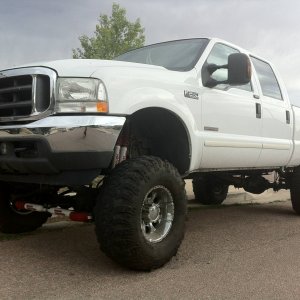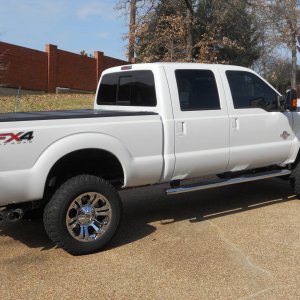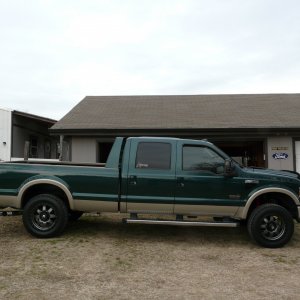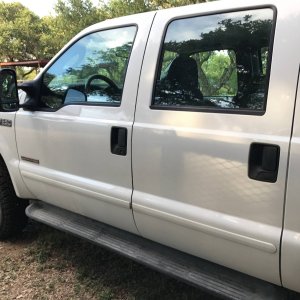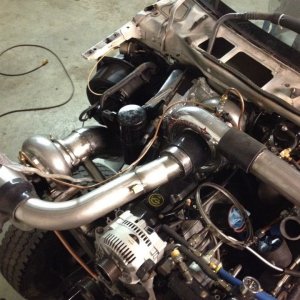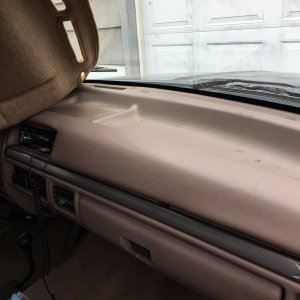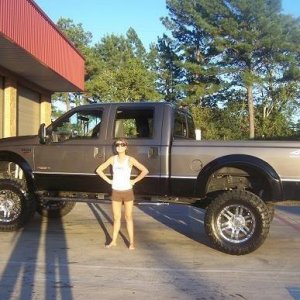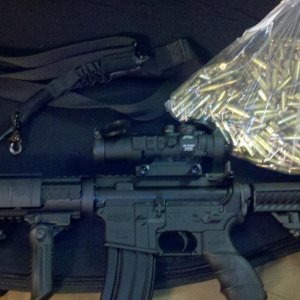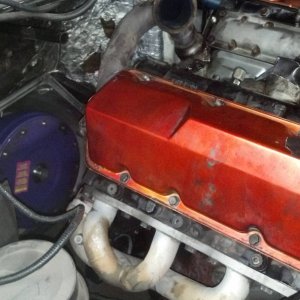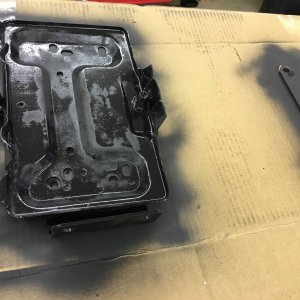You are using an out of date browser. It may not display this or other websites correctly.
You should upgrade or use an alternative browser.
You should upgrade or use an alternative browser.
250/200s sooner than later.....
- Thread starter Lowdown89
- Start date
neverkickn
New member
Just looking at the housings side by side like that I cant tell if it is the van housing or not. The only way to tell is by part number or by placing the housing on the center section with the turbin shaft in place. The van housing will have a substantially larger gap between the fins and the housing than the one that is made to fit the super duty turbine shaft. In any case, I am sure Bill would know if he had the van housing sitting there.
For giggles, here is a link to a thread with the different part numbers.
http://powerstrokearmy.com/forums/showthread.php?t=14705
For giggles, here is a link to a thread with the different part numbers.
http://powerstrokearmy.com/forums/showthread.php?t=14705
Lowdown89
New member
I can pretty much assure you that its the 38r 1.15 housing not that it couldn't have gotten screwed up when i ordered it but i highly doubt it the only thing done to both of those housings is that they have been ceramic coated
Wicked
New member
Any news Bill?
Trying to find out if the wheel is bad and I will pull it off and try to return it. Only have 350 miles on it so far.
Trying to find out if the wheel is bad and I will pull it off and try to return it. Only have 350 miles on it so far.
Power Hungry
Member
This week has been a mess! Didn't get over to the shop like I planned. :doh:
Gonna be at the shop first thing in the morning. Will have the news tomorrow afternoon.
Gonna be at the shop first thing in the morning. Will have the news tomorrow afternoon.
MadDiesel73
New member
Geez bill the suspense is killing me.. Can you give us a thumbs up or down on the BMW at least man lol!
Power Hungry
Member
Hey all. Sorry for the delay. I need to take some time yesterday to go through all the configurations and datalog every run to make sure that I am providing the most accurate information I possibly can. I appreciate everyone's patience while we took time to review and process this information and hope that everyone finds it to be useful. Now, on to the good stuff.
First, the question was asked about the part number for the exhaust housing. That number is 70213-0005 which is a true 38R 1.15 A/R housing. With that out of the way, let's move on to the testing.
In case it has been overlooked, the test vehicle used is as follows:
Ford F350 Super Duty CC DRW, A/T with 4.10 gears
Engine rebuilt in May of 2011 - .030 overbore, new Mahle pistons, forged rods, stock camshaft
Injectors - Full Force Diesel 250cc/200% Single Shot
Turbocharger - GPT38R w/1.00 A/R Wastegated Housing
HPOP - DieselSite Adrenaline
Fuel System - DieselSite CPR w/Walbro fuel pump, regulated at 70 PSI
Exhaust - 4" Downpipe back
All dyno runs are performed locked in 3rd gear with the torque converter locked to provide a 1:1 ratio through the transmission with no slippage or shifting concerns. Also, the engine speed is stabilized at 1400 RPM before starting each run so that spooling characteristics can be accurately compared.
All our original runs and datalogs were produced with the standard GTP38R turbo with the 1.0 A/R Wastegated Housing. Our best run (on 04/18) produced 566 HP and 1189 Ft./Lbs. TQ after correcting the fuel pump problem we had where pressure dropped to 25-28 PSI during the run. Even with the pressure dropping we were still in the 540's at around 1140 Ft./Lbs. TQ range. For a stock 38R I though this was rather impressive, especially when the truck starts and drives like a factory 7.3L truck, at least until you stuff the accelerator to the floor. Here are some notable points from this configuration:
Dyno Run - 04/17/2012 - GTP38R, 1.0 W/G housing, Stock compressor wheel
(All values rated at 3500 RPM)
On 04/22 we performed a pre-run to establish a base to take into account current weather conditions. Ambient temp and humidity were relatively similar to the prior runs when we installed the Walbro fuel pump, and as expected the base runs were within 5 HP and 10 Ft./Lbs. TQ of the original runs on 04/18. We removed the turbo, changed the exhaust housing to the 1.15 A/R housing and installed the BatMoWheel (BMW). Several runs into the new configuration we immediately observed a sharp drop in performance. Boost was down, EGTs were up, and HP & TQ were down. Notable points from this configuration:
Dyno Run - 04/17/2012 - GTP38R, 1.15 Non-W/G housing, BMW compressor wheel
(All values rated at 3500 RPM)
On 04/28 we performed an initial base run to verify that the current power output matched the last run we did the previous week. HP and TQ curves were comparable. We removed the turbo and re-installed the 1.0 W/G housing, leaving the BMW in place. Subsequent runs indicated that while there was a 3 PSI increase in exhaust backpressure, there was no appreciable increase in boost and power did not improve. In fact, the dyno runs from switching to the 1.0 housing were nearly identical to the 1.15 housing. Notable points from this configuration:
Dyno Run - 04/17/2012 - GTP38R, 1.00 W/G housing, BMW compressor wheel
(All values rated at 3500 RPM)
After letting the engine cool down, we again removed the turbo, re-installed the factory 38R compressor wheel, re-installed the 1.15 non-W/G housing, and then performed a series of runs. There was an immediate improvement in lower RPM spooling along with an improvement in overall performance. Notable points from this configuration:
Dyno Run - 04/17/2012 - GTP38R, 1.15 Non-W/G housing, Stock compressor wheel
(All values rated at 3500 RPM)
At this point, we've removed both the 1.15 A/R housing and BMW and reinstalled the original 38R components. Power is back up to 561 HP and 1178 Ft./Lbs. TQ and boost is still at 34 PSI. The 2-3 PSI drop in EBP from running the 1.15 housing does not justify the expense of the housing, especially since the stock 1.0 housing produced 20 more HP, 45 more Ft./Lbs., and spooled more quickly than the 1.15 housing.
This is the final comparison between the stock 38R compressor wheel and the BMW with both the 1.0 and 1.15 housing. Please note that the HP scale is on the RIGHT side of the graph and the TORQUE scale is on the left side.
(click on image to enlarge)

Our overall impression is that in this configuration neither the BMW nor the 1.15 housing performed as well as we had expected. The drop in drive pressure from the 1.15 housing, while causing a noticeable drop in peak performance, didn't have as significant of an adverse an effect on spooling characteristics and low RPM power. However, our testing and observations indicate that the BMW suffered significant losses in both peak performance and spooling characteristics, with extremely noticeable lag, higher EGTs, and more smoke throughout the RPM range.
Now for the disclaimer: I strongly urge everyone to please keep in mind that while the turbo modifications didn't offer any improvement in this configuration, it doesn't mean that there aren't applications where the modifications would offer some benefit. These are simply our observations made on a single vehicle with specific modifications and tested in a controlled, consistent environment. We offer this information as a general reference, and while we make every effort to provide accurate and unbiased data, we do not accept any responsibility for how the data we have provided is interpreted or misinterpreted. Other individuals may chose to perform their own tests and draw their own conclusions. If any manufacturers would like to receive copies of any of the dyno or datalog information we have produced from our test procedures, or if there are any questions about the test procedures themselves, we will be happy to provide that information upon request. If you are not a manufacturer, please do not request any further data outside of what has been posted in this thread.
I hope this information is helpful and informative.
First, the question was asked about the part number for the exhaust housing. That number is 70213-0005 which is a true 38R 1.15 A/R housing. With that out of the way, let's move on to the testing.
In case it has been overlooked, the test vehicle used is as follows:
Ford F350 Super Duty CC DRW, A/T with 4.10 gears
Engine rebuilt in May of 2011 - .030 overbore, new Mahle pistons, forged rods, stock camshaft
Injectors - Full Force Diesel 250cc/200% Single Shot
Turbocharger - GPT38R w/1.00 A/R Wastegated Housing
HPOP - DieselSite Adrenaline
Fuel System - DieselSite CPR w/Walbro fuel pump, regulated at 70 PSI
Exhaust - 4" Downpipe back
All dyno runs are performed locked in 3rd gear with the torque converter locked to provide a 1:1 ratio through the transmission with no slippage or shifting concerns. Also, the engine speed is stabilized at 1400 RPM before starting each run so that spooling characteristics can be accurately compared.
All our original runs and datalogs were produced with the standard GTP38R turbo with the 1.0 A/R Wastegated Housing. Our best run (on 04/18) produced 566 HP and 1189 Ft./Lbs. TQ after correcting the fuel pump problem we had where pressure dropped to 25-28 PSI during the run. Even with the pressure dropping we were still in the 540's at around 1140 Ft./Lbs. TQ range. For a stock 38R I though this was rather impressive, especially when the truck starts and drives like a factory 7.3L truck, at least until you stuff the accelerator to the floor. Here are some notable points from this configuration:
Dyno Run - 04/17/2012 - GTP38R, 1.0 W/G housing, Stock compressor wheel
(All values rated at 3500 RPM)
- Max Boost - 34 PSI
- Max EBP - 47 PSI
- Max EGT - 1300
- Peak HP - 566 @ 2613 RPM
- Peak TQ - 1189 @ 2512 RPM
On 04/22 we performed a pre-run to establish a base to take into account current weather conditions. Ambient temp and humidity were relatively similar to the prior runs when we installed the Walbro fuel pump, and as expected the base runs were within 5 HP and 10 Ft./Lbs. TQ of the original runs on 04/18. We removed the turbo, changed the exhaust housing to the 1.15 A/R housing and installed the BatMoWheel (BMW). Several runs into the new configuration we immediately observed a sharp drop in performance. Boost was down, EGTs were up, and HP & TQ were down. Notable points from this configuration:
Dyno Run - 04/17/2012 - GTP38R, 1.15 Non-W/G housing, BMW compressor wheel
(All values rated at 3500 RPM)
- Max Boost - 31 PSI
- Max EBP - 44 PSI
- Max EGT - 1400
- Peak HP - 522 @ 2621 RPM
- Peak TQ - 1058 @ 2593 RPM
- Net HP Loss - 44 HP
- Net TQ Loss - 131 Ft./Lbs.
On 04/28 we performed an initial base run to verify that the current power output matched the last run we did the previous week. HP and TQ curves were comparable. We removed the turbo and re-installed the 1.0 W/G housing, leaving the BMW in place. Subsequent runs indicated that while there was a 3 PSI increase in exhaust backpressure, there was no appreciable increase in boost and power did not improve. In fact, the dyno runs from switching to the 1.0 housing were nearly identical to the 1.15 housing. Notable points from this configuration:
Dyno Run - 04/17/2012 - GTP38R, 1.00 W/G housing, BMW compressor wheel
(All values rated at 3500 RPM)
- Max Boost - 31 PSI
- Max EBP - 47 PSI
- Max EGT - 1400
- Peak HP - 525 @ 2689 RPM
- Peak TQ - 1055 @ 2575 RPM
- Net HP Loss - 41 HP
- Net TQ Loss - 134 Ft./Lbs.
After letting the engine cool down, we again removed the turbo, re-installed the factory 38R compressor wheel, re-installed the 1.15 non-W/G housing, and then performed a series of runs. There was an immediate improvement in lower RPM spooling along with an improvement in overall performance. Notable points from this configuration:
Dyno Run - 04/17/2012 - GTP38R, 1.15 Non-W/G housing, Stock compressor wheel
(All values rated at 3500 RPM)
- Max Boost - 34 PSI
- Max EBP - 45 PSI
- Max EGT - 1300
- Peak HP - 542 @ 2620 RPM
- Peak TQ - 1141 @ 2433 RPM
- Net HP Loss - 24 HP
- Net TQ Loss - 48 Ft./Lbs.
At this point, we've removed both the 1.15 A/R housing and BMW and reinstalled the original 38R components. Power is back up to 561 HP and 1178 Ft./Lbs. TQ and boost is still at 34 PSI. The 2-3 PSI drop in EBP from running the 1.15 housing does not justify the expense of the housing, especially since the stock 1.0 housing produced 20 more HP, 45 more Ft./Lbs., and spooled more quickly than the 1.15 housing.
This is the final comparison between the stock 38R compressor wheel and the BMW with both the 1.0 and 1.15 housing. Please note that the HP scale is on the RIGHT side of the graph and the TORQUE scale is on the left side.
(click on image to enlarge)
Our overall impression is that in this configuration neither the BMW nor the 1.15 housing performed as well as we had expected. The drop in drive pressure from the 1.15 housing, while causing a noticeable drop in peak performance, didn't have as significant of an adverse an effect on spooling characteristics and low RPM power. However, our testing and observations indicate that the BMW suffered significant losses in both peak performance and spooling characteristics, with extremely noticeable lag, higher EGTs, and more smoke throughout the RPM range.
Now for the disclaimer: I strongly urge everyone to please keep in mind that while the turbo modifications didn't offer any improvement in this configuration, it doesn't mean that there aren't applications where the modifications would offer some benefit. These are simply our observations made on a single vehicle with specific modifications and tested in a controlled, consistent environment. We offer this information as a general reference, and while we make every effort to provide accurate and unbiased data, we do not accept any responsibility for how the data we have provided is interpreted or misinterpreted. Other individuals may chose to perform their own tests and draw their own conclusions. If any manufacturers would like to receive copies of any of the dyno or datalog information we have produced from our test procedures, or if there are any questions about the test procedures themselves, we will be happy to provide that information upon request. If you are not a manufacturer, please do not request any further data outside of what has been posted in this thread.
I hope this information is helpful and informative.
MadDiesel73
New member
Well this confirms what my pro sotp meter has been telling me. Looks like I'll be calling bullseye turbo in the morning.... Thanks bill for your professional analysis of all the configurations. This is super informative and pretty much puts to bed one of the most common mod discussions for the old 7.3. Matt @ Gearhead has told me a few times theres not to much point going to the 1.15. And this proves that with numbers and graphs in a controled test like we havnt seen yet but desperately needed. Great work bill.
Last edited:
Lowdown89
New member
Well this confirms what my pro sotp meter has been telling me. Looks like I'll be calling bullseye turbo in the morning.... Thanks bill for your professional analysis of all the configurations. This is super informative and pretty much puts to bed one of the most common mod discussions for the old 7.3. Matt @ Gearhead has told me a few times theres not to much point going to the 1.15. And this proves that. Great work bill.
Ask em for a group return rate lol because I would like to see some money or something back as well
Daryl@TDP
New member
Wow that's really interesting, I had wondered what this wheel would do for a 38r. Thanks for taking the time and doing all the testing and letting your truck be used as a test subject. I always wondered if it would be worth the 400 bucks and time.
Lowdown89
New member
Wow that's really interesting, I had wondered what this wheel would do for a 38r. Thanks for taking the time and doing all the testing and letting your truck be used as a test subject. I always wondered if it would be worth the 400 bucks and time.
Sure thing, I had seen all the positive stuff that people were saying about them on the 6.0's, in the cummins trucks, 6.4 trucks and what not so I really thought it was gonna show something positive but I was wrong... But if you don't try things out you never know and I really wanted to see just how much power we could get out the 38r and these injectors... I'm glad bill was willing to try all the different combos out so we all know for sure. Now hopefully i hear something soon from twisted, so i can get my transmission.... the truck will almost be ready to hit the road again after that
TrailerHauler
Active member
Great, and solid info! That should be to rest any skepticism anyone was having about those turbo combinations. I'm rather surprised at the negative results that the 1.15 housing yielded as well, because that's always been a rather popular mod to squeeze a little more from the 38r. But I suppose like Bill said those were results from lowdowns truck and configurationg, and each truck or configuration always seems to be a little different even with the same modifications.
Lowdown89
New member
Hopefully I can sell the 1.15 housing to someone with a different setup who possibly could benefit from it, if anyone knows of someone who wants it's it's theirs for $400 shipped thats the housing and adapter,they have both been ceramic coated as for the batmowheel if someone else with a 38r and different Injectors wants to give it a try I will make them a deal on it
Aaron S
New member
- Joined
- May 22, 2011
- Messages
- 169
- Reaction score
- 0
Very cool tests and thanks for performing them for our benifit.
Ive got a question about the egts. With the horsepower your making id imagine your running the injectors to there max, as in not detuned at all. The egt seems incredibly low for that amount of fuel, is it just the fact that it is a quick dyno run? I know its been talked about in the past that larger nozzles will produce higher horsepower with lower temps so it kinda makes sense. The next question is, what kind of temps do you see on the road under a full throttle run?
Thanks for the info again.
Aaron
Ive got a question about the egts. With the horsepower your making id imagine your running the injectors to there max, as in not detuned at all. The egt seems incredibly low for that amount of fuel, is it just the fact that it is a quick dyno run? I know its been talked about in the past that larger nozzles will produce higher horsepower with lower temps so it kinda makes sense. The next question is, what kind of temps do you see on the road under a full throttle run?
Thanks for the info again.
Aaron
farm boy
New member
Thanks for all the great testing info.
Whats hard to understand, is the fact that these 2 runs had the same max boost psi, only 2 ebp psi difference, and the same max egt's, but yet a 24hp loss. I would love to hear everyone's theory on why the loss of Hp & Tq.
Thanks again for all the time put into this.
Dyno Run - 04/17/2012 - GTP38R, 1.0 W/G housing, Stock compressor wheel
(All values rated at 3500 RPM)
Max Boost - 34 PSI
Max EBP - 47 PSI
Max EGT - 1300
Peak HP - 566 @ 2613 RPM
Peak TQ - 1189 @ 2512 RPM
Dyno Run - 04/17/2012 - GTP38R, 1.15 Non-W/G housing, Stock compressor wheel
(All values rated at 3500 RPM)
Max Boost - 34 PSI
Max EBP - 45 PSI
Max EGT - 1300
Peak HP - 542 @ 2620 RPM
Peak TQ - 1141 @ 2433 RPM
Net HP Loss - 24 HP
Net TQ Loss - 48 Ft./Lbs.
Whats hard to understand, is the fact that these 2 runs had the same max boost psi, only 2 ebp psi difference, and the same max egt's, but yet a 24hp loss. I would love to hear everyone's theory on why the loss of Hp & Tq.
Thanks again for all the time put into this.
Dyno Run - 04/17/2012 - GTP38R, 1.0 W/G housing, Stock compressor wheel
(All values rated at 3500 RPM)
Max Boost - 34 PSI
Max EBP - 47 PSI
Max EGT - 1300
Peak HP - 566 @ 2613 RPM
Peak TQ - 1189 @ 2512 RPM
Dyno Run - 04/17/2012 - GTP38R, 1.15 Non-W/G housing, Stock compressor wheel
(All values rated at 3500 RPM)
Max Boost - 34 PSI
Max EBP - 45 PSI
Max EGT - 1300
Peak HP - 542 @ 2620 RPM
Peak TQ - 1141 @ 2433 RPM
Net HP Loss - 24 HP
Net TQ Loss - 48 Ft./Lbs.
MadDiesel73
New member
I think it might have something to do with spool times. I'm just guessing but my thought is the faster it spools the sooner it makes power the more rotational volocity and other (air volocity) the more power is pushed so to say.. I dunno just a guess.. School me
I wonder if where everyone sees the benefits for the 1.15 is going from a non waste-gated 1.0. That would explain why some get a noticeable benefit and then others do not. Add in differences in tuning and parts.
Is there a non-wastegated 38r? Or are you just saying in general?

